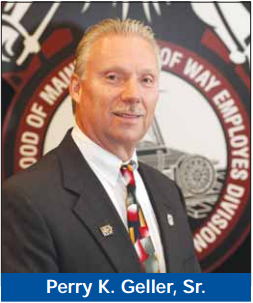2014 December Secretary-Treasurer's Report: A New Year brings new challenges, but through solidarity, we can prevail Published: Jan 30 2015 3:51PM

As we enter the New Year, the BMWED will also enter into the next round of collective bargaining for the 2015 wages, rules and benefits with the National Carriers’ Conference Committee (NCCC). The BMWED and the NCCC have exchanged Section 6 notices (contract demands) under provisions of the Railway Labor Act, commencing the bargaining sessions.
As union members, we have the right to collectively bargain over wages, rules and benefits. However, the vast majority of the U.S. workforce does not have collective bargaining rights because they are employed in non-union workplaces. Union membership and collective bargaining were once the cornerstones of the American middle class. In the 1950s, approximately 35 percent of the U.S. workforce belonged to a union, the middle class was relatively secure, and income inequality between workers and the rich was fairly narrow. Today, however, only 6.7 percent of the private sector workforce belongs to a union and the widening gap in income inequality —which has risen dramatically since the late 1970s — has a direct relationship to the decline in union membership.
So what does being a union member mean for you and your family, and how does union density impact income inequality? According to the Bureau of Labor Statistics (BLS), union workers receive larger wage increases than those of non-union workers, generally earn higher wages than non-organized workers, and also have greater access to most of the common employer-sponsored benefits.
Research clearly shows that union members earn better wages and benefits than workers who aren’t union members. On average, union workers’ wages are 27 percent higher than their non-union counterparts. More than 79 percent of union workers have jobs that provide health insurance benefits, but less than half of non-union workers do. And unionized workers are 60 percent more likely to have employer-provided pensions. Additionally, unions help employers create a more stable, safe, and productive workforce—where workers have a say in improving their work lives, work products, and job safety through their unions.
Unions are not only beneficial for their membership, they are also beneficial for the overall economy. When unions are strong, they make gains that then spread throughout the economy. When unions improve wages for their members, non-union employers generally raise their wages in order to attract and retain employees. This in turn gives all workers more purchasing power to buy goods and services and stimulate the economy. In short, a rising tide lifts all boats and more disposable income means more economic activity.
Despite the constant rhetoric we hear from the political right, unions are not the problem; unions are part of the solution to the increasing poverty and growing income inequality in the United States. If unions did not exist, there would be no one to advocate for workers’ wages, benefits, and working conditions, and income inequality and poverty would increase at an even faster rate than it is today.
As we enter the 2015 round of bargaining, the railroad industry is financially strong with future projections showing continuing growth and increased profitability. That growth and profitability is a direct result of your hard work and productivity in safely and skillfully maintaining the tracks, bridges and infrastructure of our nation’s railroads in a professional manner. Our intent entering this next bargaining round is to ensure you are justly compensated for your hard work and help preserve the American Dream for you and your love ones. We know we have our work cut out for us in this next round of negotiations, but with your solidarity and support we will prevail.
As we close out 2014 and look to the challenges that lie ahead, I want to take this opportunity to thank you for your hard work and dedication and wish you and your family a joyful holiday season and a happy, healthy and prosperous New Year.